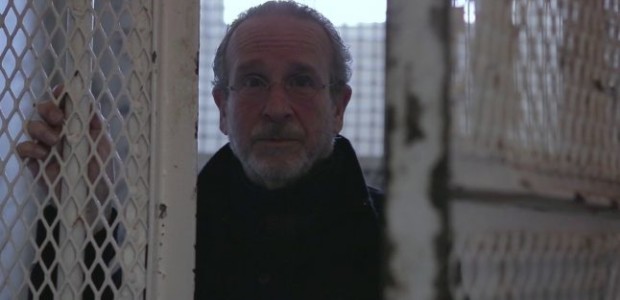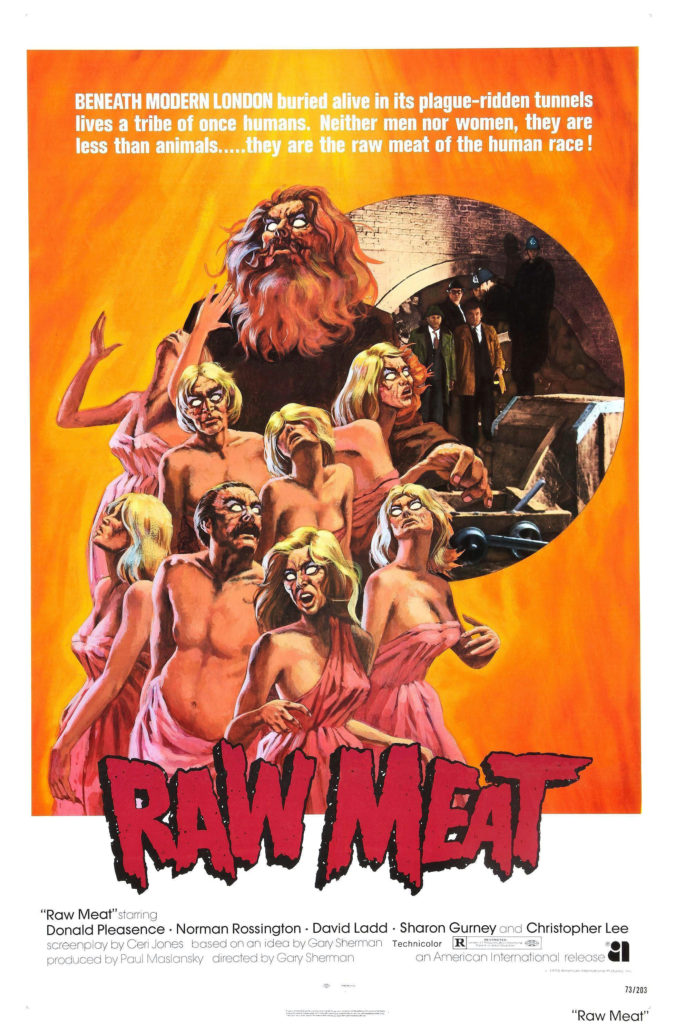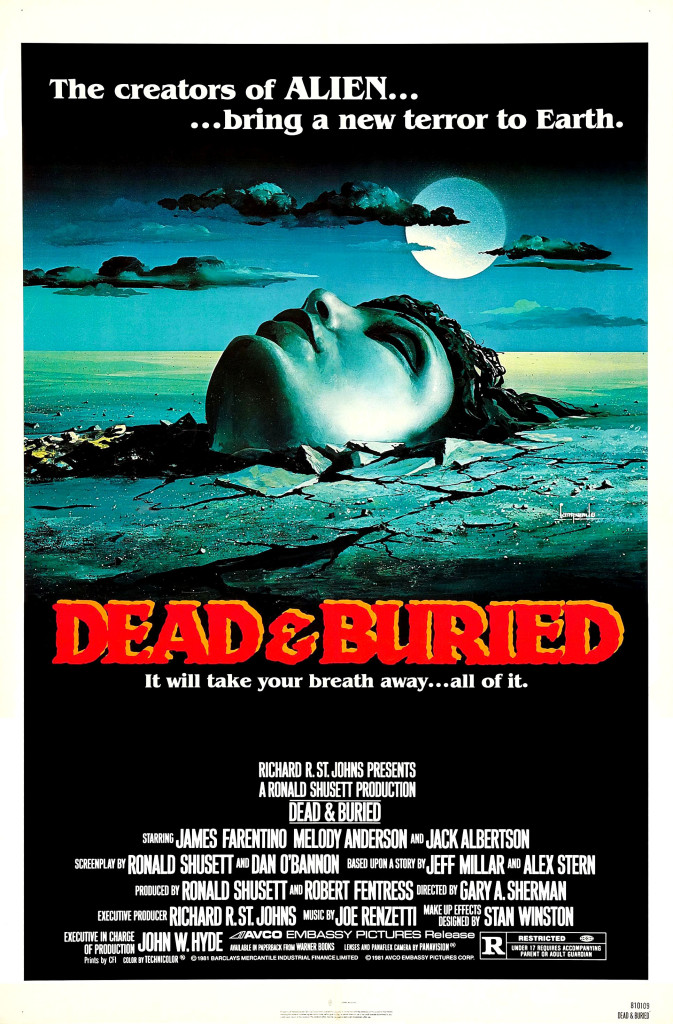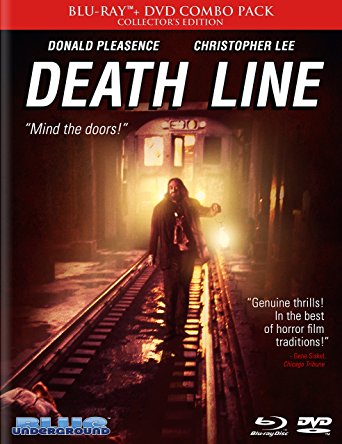For our money, Gary Sherman is a filmmaker whose work is fascinating and unique and perennially worthy of rediscovery. (For only two examples, check out our reviews of his horror films DEATH LINE andDEAD & BURIED).
Daily Grindhouse’s Wendi Freeman and Nathan Smith got the chance to ask Gary Sherman a few questions, courtesy of our friends at Severin, who released DEATH LINE on Blu-Ray this week.
Daily Grindhouse: DEATH LINE draws on the history of the London Tube and a 16th century Scottish clan of cannibals. Do you generally draw influence from history?
Gary Sherman: If you consider that yesterday, last week or last month is history, then yes all of my writing is based on history. I am an incurable researcher. DEATH LINE is the only one of my films that goes as far back as it does. The rest of my films have all been contemporary, and with the exception of my least favorite of my films, POLTERGEIST III, they have all been based on real, or at least possible, situations. So I will admit that I put a lot of time into research to make my work as real as possible. That includes my television work. A few years ago, I developed a, so far unproduced, futuristic miniseries for the Syfy channel. Even in that case, I read every scientific projection of the future I could find in order to be as factual as possible.
What time periods fascinate you?
The early part of the 20th century I find really interesting. When cars were starting to take over from horses. And The Industrial Revolution was really getting into high gear. If I could’ve chosen another era to live in, as a film director, I really would have liked to have been making films when almost anything you did was innovative. Yes I love technology, but it’s really fun to come up with the analog solutions to problems.
What was it like being an American director shooting in the UK in the 1970s?
It was great! Nixon had just been elected president in the United States, so I didn’t want to be there. My mother was British, making it easy for me to get a green card. I had lots of family there, so I never really felt like a foreigner. I was, at first, a bit intimidated by British accents, but soon realized that they were just is intimidated by my Chicago accent, so I used to push that to the limit with Dee’s, Dem’s and Dose’s and the occasional 4 letter expletive. It worked. But seriously, I loved working in London and made many lifelong friends.
What is the most striking difference between the DEATH LINE and RAW MEAT edits of the film?
Robin Wood put it best in his 1973 article, “Butchered”, in the Village Voice. He basically said that AIP and Samuel Z. Arkoff had raped and brutalized DEATH LINE. BTW, the 2003 DVD released by MGM was in fact DEATH LINE. It was only titled RAW MEAT. No one, fortunately, has seen the film released by AIP since 1974 at the latest. In the US, from ’74 until ’03, most people were watching pirated prints of DEATH LINE. The differences? The biggest was that the tracking shot was cut up and speed throughout the film. Mr. Arkoff felt that the “great unwashed,” that’s YOU, could not sit through a seven minute shot. They also dubbed some of Donald Pleasence, and some other British characters, into Mid-Atlantic because AIP doubted that Americans could understand what they were saying. I was devastated that anyone could take those kind of liberties with my work, and one that I was proud to have my name on. That’s why I continued making commercials and TV untilDEAD & BURIED some 8 years later.
What are you pleased with in the Blue Underground Blu-Ray release?
In short… Everything! Bill Lustig and Greg Chick are the best. They didn’t cut corners on any aspect of the restoration or the release.
What was it like working with Donald Pleasence in the film?
Donald was the best. A gentleman and a pro. I was so excited about casting him, it wasn’t until the first day on set that I realized that this twenty-something snot-nosed kid was about to direct one of Britain’s most highly regarded actors. I was scared shitless. But several days earlier, I had been introduced to one of my Gods, Robert Altman. He had been told I was about to direct my first feature film. He put an arm around my shoulder, walked me to a far corner of the room and said, “You want to know the real secret of directing?” I silently nodded. With a serious expression on his face, he stared into my eyes and said, “Just stand there… and make everyone think… you know exactly what the fuck you’re doing!” I took that advice. It worked out. Donald tested me at the beginning and I passed. We became great friends.
You mentioned a Chicago set remake of DEATH LINE some time ago. Any updates on that?
We are having the European premiere of the restored DEATH LINE at Sitges in October. Hopefully, at that time, I will be in a position to make an announcement as to the future of DEATH LINE.
I recently watched DEAD & BURIED for the first time and was blown away. It’s still being discovered by audiences some thirty years later. Would you say that speaks to the timelessness of the tale?
I have been fortunate enough to have had three of my films stand the test of time. Some have said there’s others but these are my three: DEATH LINE,DEAD & BURIED, and VICE SQUAD. The reason? All three of these films have a purpose and a message. DEATH LINE set it’s sights on classism, on the uncaring of the “ruling” classes toward the underprivileged. As relevant, if not more so, today as 45 years ago. The underlying theme of DEAD & BURIED points at the manipulation of the populace by their leader(s). Also more relevant and recognizable in today’s politics than it was in 1980. And in VICE SQUAD, violence against women and the exploitation of women was what I wanted to use my public platform to expose. That is why I think these films are timeless.
Rutger Hauer’s character in WANTED: DEAD OF ALIVE is intended to be a descendant of the Steve McQueen character from the TV show. Did you give him any specific direction or ask him to convey a McQueen influence? Were there any nods to the original show?
WANTED: DEAD OF ALIVE is presently a great sadness in my life. When it was made, well prior to 9/11, my aim was to condemn terrorism no matter its source. Post 9/11, it is my fear that the message of the film is anti-Muslim. That was never meant to be my intention. The character portrayed by Gene Simmons was a monster who represented evil. His religion, ethnic background etc. were irrelevant to his lack of humanity. Having gotten that off my chest, Rutger and I did watch some old episodes together and talked about it. Nick Randall, in the film, did speak about great-grandpa, Josh Randall, a few time and did have his great-grandpa’s famous rifle framed and hanging on the wall in his boat. Nick’s sawn-off shotgun was also a “nod” to the original.
Could you provide any update on when ’39: A Film by Carroll McKane’ might see the light of day?
Never, probably. Although I am constantly coaxed by others to release it, I made it as an experiment and I’m not satisfied with the result. I have no plans to direct another film, and I certainly would not want 39 to be the film for which I’d be remembered.
Has your friendship with and influence on Guillermo Del Toro led you to see your work from any different angles?
All I’ll say about that is if it really was DEATH LINE that influenced Guillermo to become a film director, then I am very proud to know that I contributed so much to our genre and industry.
- [THE BIG QUESTION] WHAT’S YOUR FAVORITE FEMALE ENSEMBLE IN MOVIES? - July 22, 2016
- [IN THEATERS NOW] THE BOY (2016) - January 24, 2016
- Cult Movie Mania Releases Lucio Fulci Limited Edition VHS Sets - January 5, 2016
Tags: Gary Sherman, Interviews









No Comments